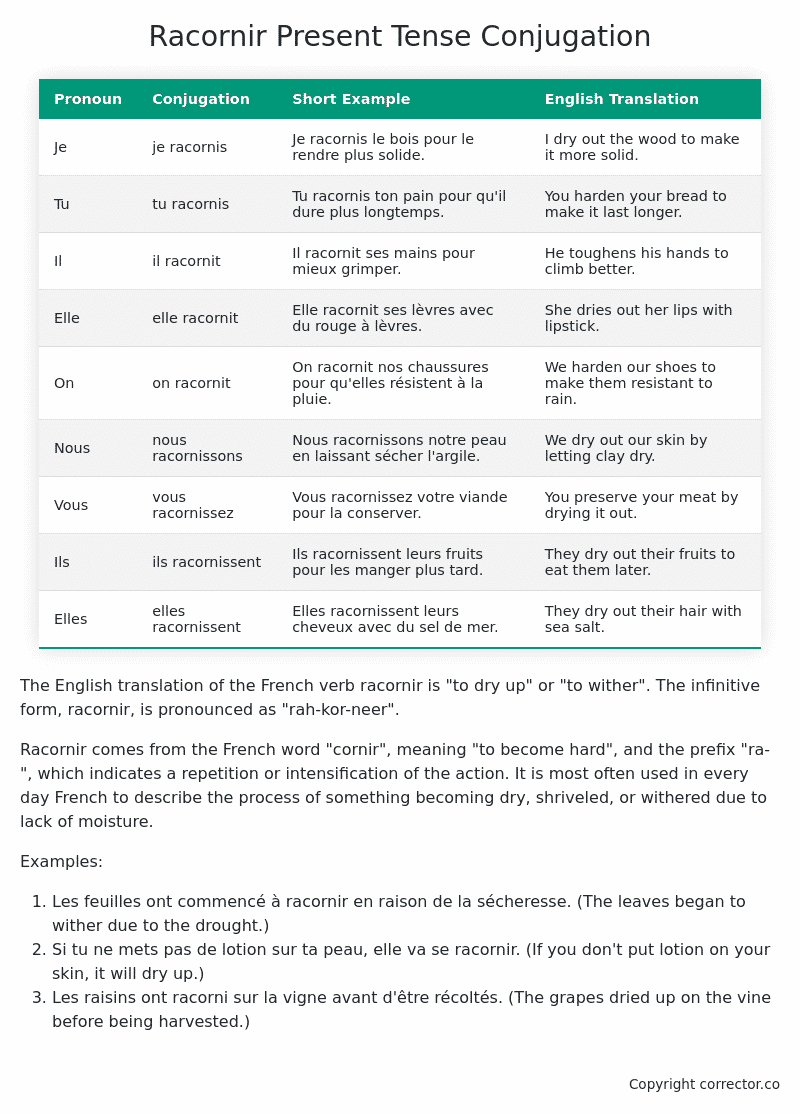Le Present (Present Tense) Conjugation of the French Verb racornir
Introduction to the verb racornir
The English translation of the French verb racornir is “to dry up” or “to wither”. The infinitive form, racornir, is pronounced as “rah-kor-neer”.
Racornir comes from the French word “cornir”, meaning “to become hard”, and the prefix “ra-“, which indicates a repetition or intensification of the action. It is most often used in every day French to describe the process of something becoming dry, shriveled, or withered due to lack of moisture.
Examples:
- Les feuilles ont commencé à racornir en raison de la sécheresse. (The leaves began to wither due to the drought.)
- Si tu ne mets pas de lotion sur ta peau, elle va se racornir. (If you don’t put lotion on your skin, it will dry up.)
- Les raisins ont racorni sur la vigne avant d’être récoltés. (The grapes dried up on the vine before being harvested.)
Racornir – About the French Present Tense
To take a deep dive into all the French tenses then see our article on Mastering French Tense Conjugation.
Common Everyday Usage Patterns For Le Present
Interactions with Other Tenses
Table of the Present Tense Conjugation of racornir
| Pronoun | Conjugation | Short Example | English Translation |
|---|---|---|---|
| Je | je racornis | Je racornis le bois pour le rendre plus solide. | I dry out the wood to make it more solid. |
| Tu | tu racornis | Tu racornis ton pain pour qu’il dure plus longtemps. | You harden your bread to make it last longer. |
| Il | il racornit | Il racornit ses mains pour mieux grimper. | He toughens his hands to climb better. |
| Elle | elle racornit | Elle racornit ses lèvres avec du rouge à lèvres. | She dries out her lips with lipstick. |
| On | on racornit | On racornit nos chaussures pour qu’elles résistent à la pluie. | We harden our shoes to make them resistant to rain. |
| Nous | nous racornissons | Nous racornissons notre peau en laissant sécher l’argile. | We dry out our skin by letting clay dry. |
| Vous | vous racornissez | Vous racornissez votre viande pour la conserver. | You preserve your meat by drying it out. |
| Ils | ils racornissent | Ils racornissent leurs fruits pour les manger plus tard. | They dry out their fruits to eat them later. |
| Elles | elles racornissent | Elles racornissent leurs cheveux avec du sel de mer. | They dry out their hair with sea salt. |
Other Conjugations for Racornir.
Le Present (Present Tense) Conjugation of the French Verb racornir (this article)
Imparfait (Imperfect) Tense Conjugation of the French Verb racornir
Passé Simple (Simple Past) Tense Conjugation of the French Verb racornir
Passé Composé (Present Perfect) Tense Conjugation of the French Verb racornir
Futur Simple (Simple Future) Tense Conjugation of the French Verb racornir
Futur Proche (Near Future) Tense Conjugation of the French Verb racornir
Plus-que-parfait (Pluperfect) Tense Conjugation of the French Verb racornir
Passé Antérieur (Past Anterior) Tense Conjugation of the French Verb racornir
Futur Antérieur (Future Anterior) Tense Conjugation of the French Verb racornir
Subjonctif Présent (Subjunctive Present) Tense Conjugation of the French Verb racornir
Subjonctif Passé (Subjunctive Past) Tense Conjugation of the French Verb racornir
Subjonctif Imparfait (Subjunctive Imperfect) Tense Conjugation of the French Verb racornir
Subjonctif Plus-que-parfait (Subjunctive Pluperfect) Tense Conjugation of the French Verb racornir
Conditionnel Présent (Conditional Present) Tense Conjugation of the French Verb racornir
Conditionnel Passé (Conditional Past) Tense Conjugation of the French Verb racornir
L’impératif Présent (Imperative Present) Tense Conjugation of the French Verb racornir
L’infinitif Présent (Infinitive Present) Tense Conjugation of the French Verb racornir
Struggling with French verbs or the language in general? Why not use our free French Grammar Checker – no registration required!
Get a FREE Download Study Sheet of this Conjugation 🔥
Simply right click the image below, click “save image” and get your free reference for the racornir Present Tense tense conjugation!

I hope you enjoyed this article on the verb racornir. Still in a learning mood? Check out another TOTALLY random French verb present conjugation!


